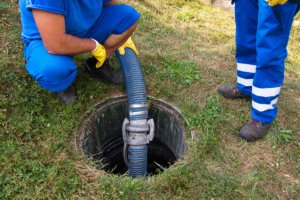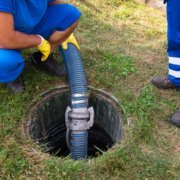Does your holiday cottage have a septic tank?
Last Updated on March 20, 2019 by admin
Owners of rural holiday cottages should be careful not to fall foul of new septic tank regulations
 When you think about a holiday home, emotive thoughts of stunning locations, long summer evenings and fun with family and friends are often some of the first things that spring to mind. An important, albeit less glamorous aspect of owning a rural home or holiday cottage is dealing with sewage. Not a problem if your property is connected to the main sewerage system, but what if it isn’t?
When you think about a holiday home, emotive thoughts of stunning locations, long summer evenings and fun with family and friends are often some of the first things that spring to mind. An important, albeit less glamorous aspect of owning a rural home or holiday cottage is dealing with sewage. Not a problem if your property is connected to the main sewerage system, but what if it isn’t?
Does your cottage have a septic tank or a private sewage treatment plant?
As many holiday homes across the country are based in rural, coastal and countryside areas, it’s not uncommon for them to be served by a septic tank or private sewage treatment plant (STP). If your cottage has either of these then you’ll need to comply with The Environmental Permitting (England and Wales) Regulations 2016, which came into force on 1st January 2017 and need to be adhered to by 1st January 2020, or sooner if pollution is already occurring or you wish to sell the property this year.
So, for those that perhaps aren’t fully acquainted with waste management systems, what actually is the difference between a septic tank and a STP?
Septic Tanks
A septic tank is the most common and well-known of potential waste disposal systems. Sewage from the holiday home enters the tank, which is usually buried underground or situated away from the property, with solid matter staying within the tank and liquids flowing out for disposal.
Strutt and Parker reports that a 2010 study by Natural England found around 80% of septic tanks weren’t working satisfactorily, with the outflow pipe from many older systems flowing straight into a field drain and eventually to an open watercourse or, in some cases, directly into streams and rivers themselves.
If your septic tank is currently leading to any of these watercourses, then you’ll need to take remedial action before the end of this year to prevent any potential fines or further pollution and damage to your local area.
Private Sewage Treatment Plants
A private sewage treatment plant operates much like a mini sewage works. Pumping and aeration equipment within the plant enhances the breakdown of waste, meaning that any effluent discharged is much cleaner when compared to a traditional sewage septic tank, and can therefore be discharged into rivers and streams (subject to an Environment Agency permit where appropriate).
Practical Steps for you to take
The following useful information has been taken from Strutt and Parker’s recent guide on septic tanks and sewage treatment plants. You can find a link to their full information at the bottom of this blog post.
Septic Tank Owners
The first thing to say is that every property needs somewhere to place its waste, but if your holiday home is served by a private septic tank or a private sewage treatment plant (STP), you’ll need to ensure that this is compliant with The Environmental Permitting (England and Wales) Regulations 2016 which have come in to place.
Check that your septic tank is:
- Discharging to the ground only
- Discharging domestic sewage only
- Not discharging more than 2m cubed per day
- Regularly de-sludged by a registered waste handler
Also check that your septic tank:
- Has sound, properly fitting lids and covers
- If installed prior to 1st January 2015, is more than 50m from any well or borehole and is outside a Special Protection Zone
- If installed after 1st January 2015, is also outside any designated sensitive area (DSA)
- Shows no evidence of overflowing or pollution (If there is effluent visible in the vicinity of your tank, your tank needs to be emptied, or your ground discharge is not working properly – or both. Surface run-off of effluent is likely to end up in a watercourse which is illegal.)
If your septic tank is ticking all of these boxes then no further action should be required. However, if you fail to meet any of these requirements then you’ll need to employ a competent professional to remedy any issues before 1st January 2020 passes.
Owners of a sewage treatment plant
Check that:
- Working parts are suitably serviced –advisable to have a management contract with a specialist
- The plant is regularly de-sludged by a registered waste handler
- There is no evidence of overflowing or pollution
In addition check that it’s:
- Outside of a designated sensitive area (DSA)
- Handling domestic (i.e. not commercial) sewage only
- Not discharging more than 5m cubed per day
- Installed in accordance with the planning and building regulations in place at the time (pre-1983 installations are deemed to comply automatically with this)
- Installation date was pre-1st January 2015.
If your STP is meeting the requirements then you shouldn’t need to take remedial action. In the event that it isn’t, it’s recommended that you seek professional advice to quickly remedy any issues.
For more information on this topic you can download your own copy of Strutt and Parker’s guidance below:
Additional information is available on the Government’s website below:
When holiday letting your second home to paying guests it’s essential to take advice on suitable insurance. Boshers offer specialist holiday home insurance to holiday letting owners across the UK. Need an insurance quote for your holiday home or cottage complex? Please give us a call on 01237 429444.









Leave a Reply
Want to join the discussion?Feel free to contribute!